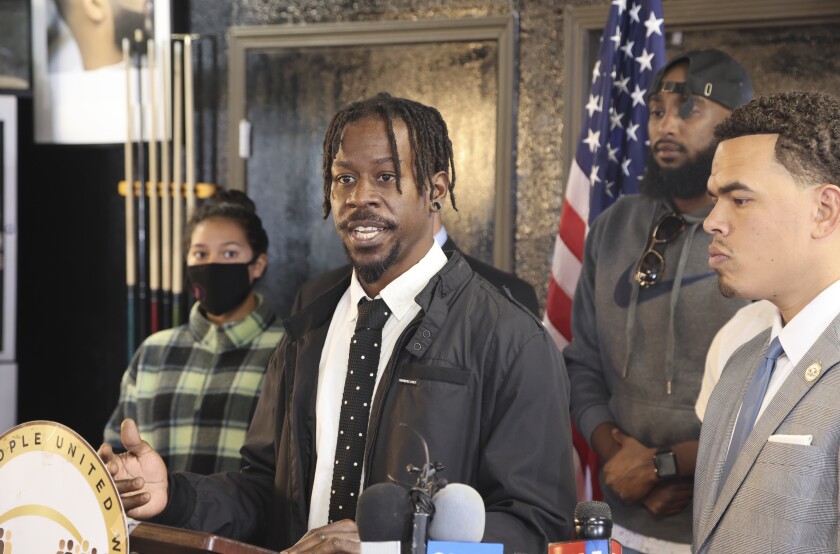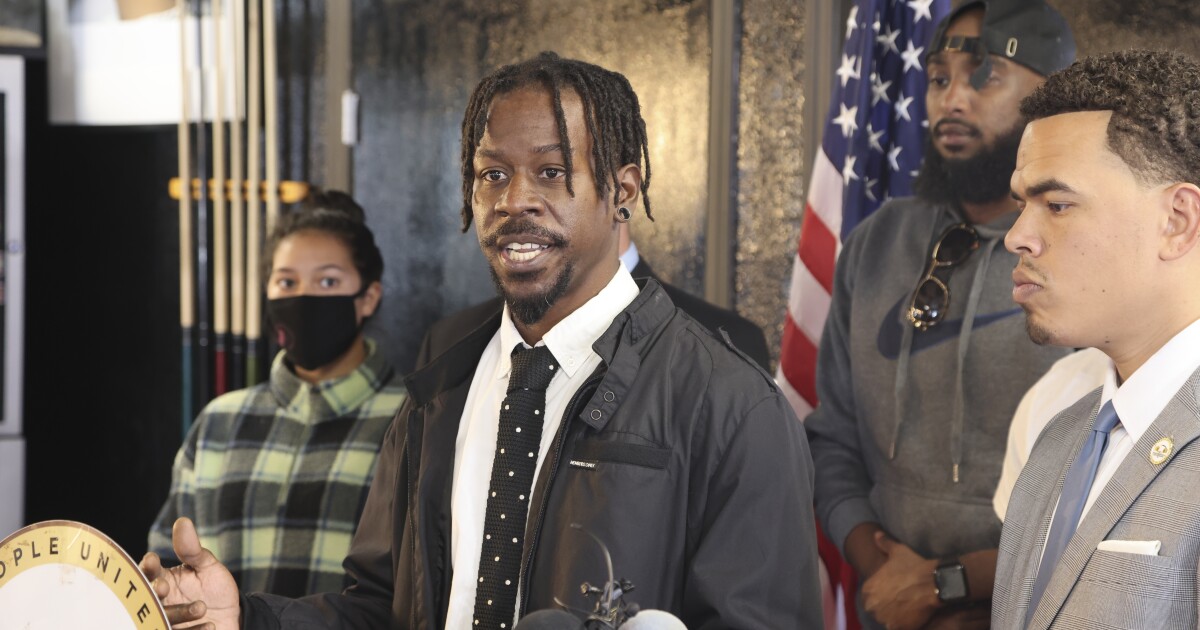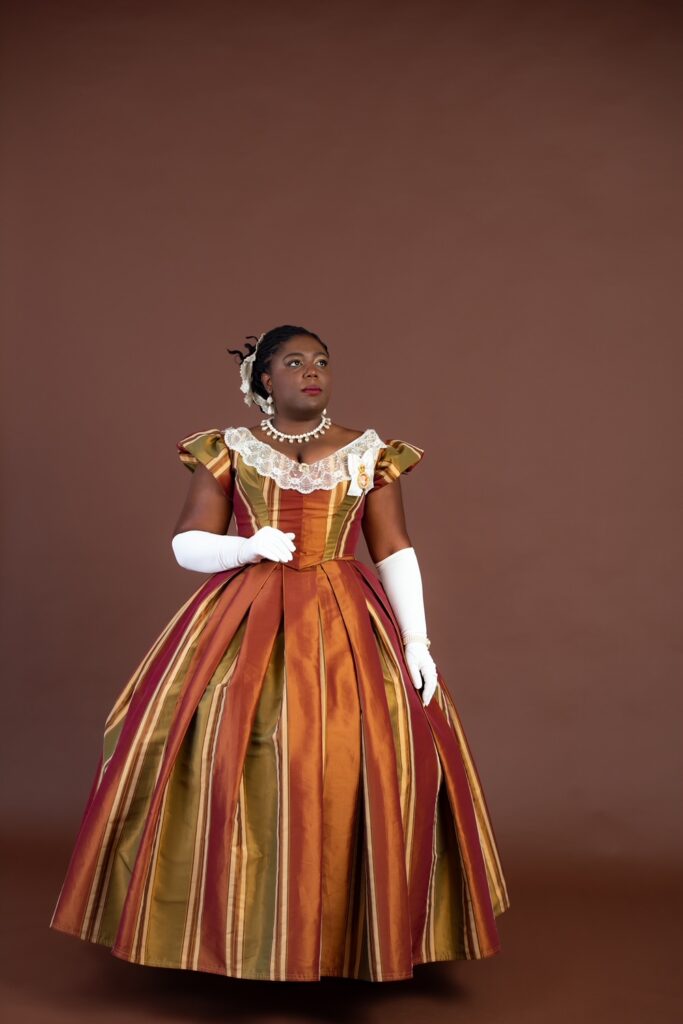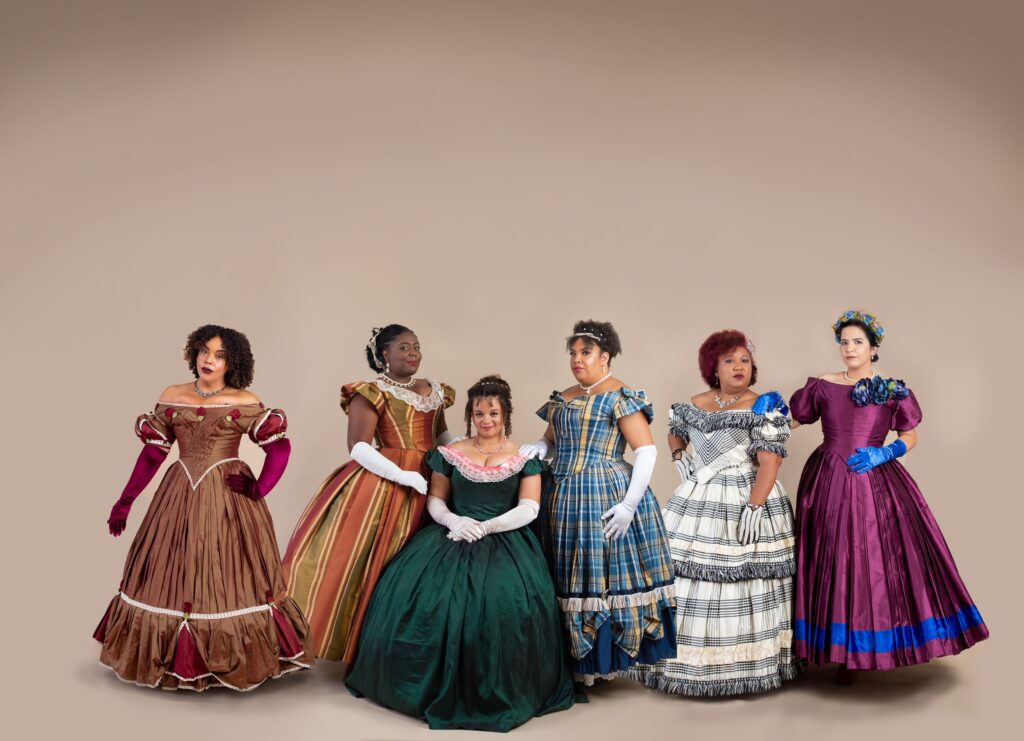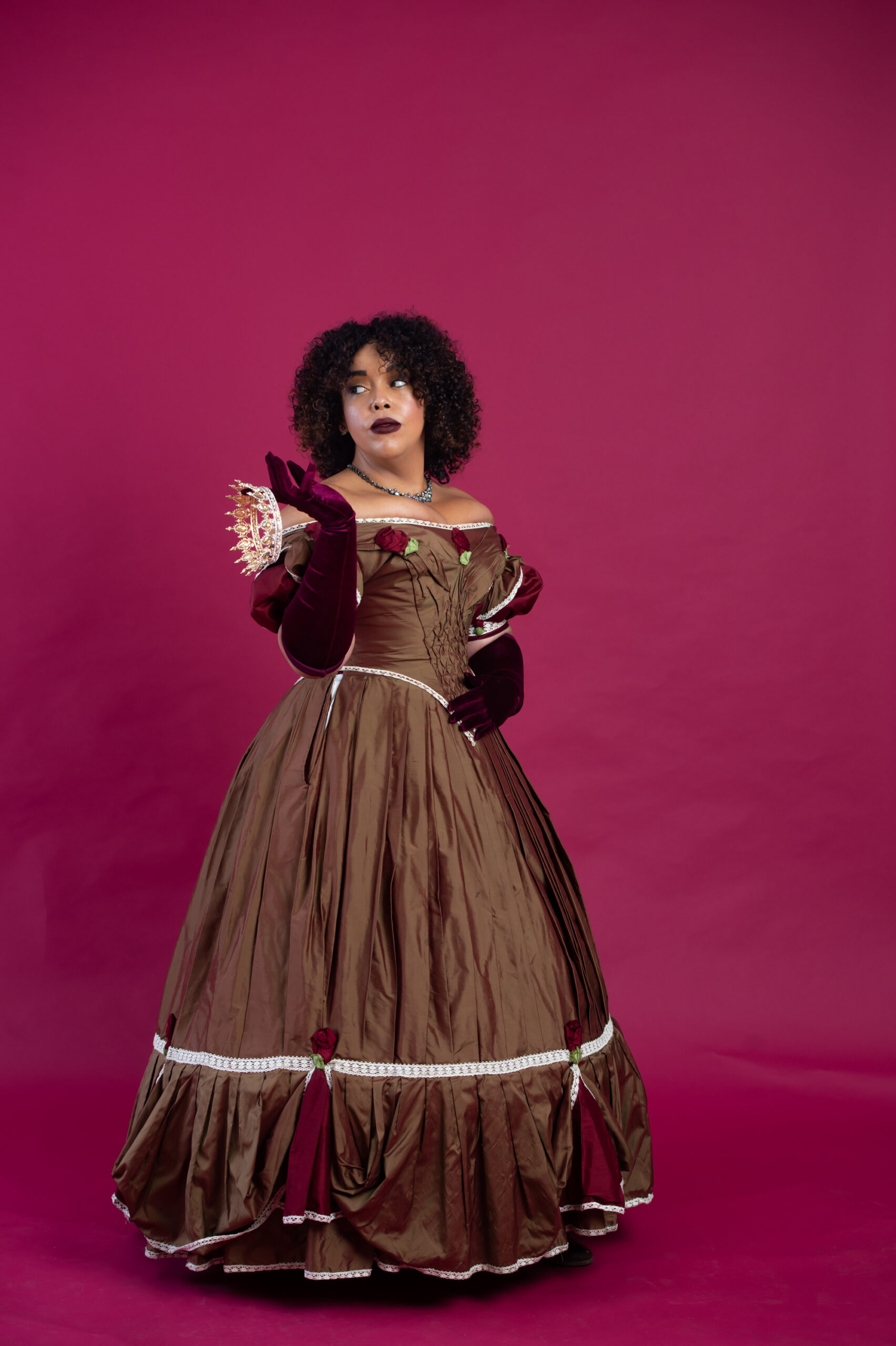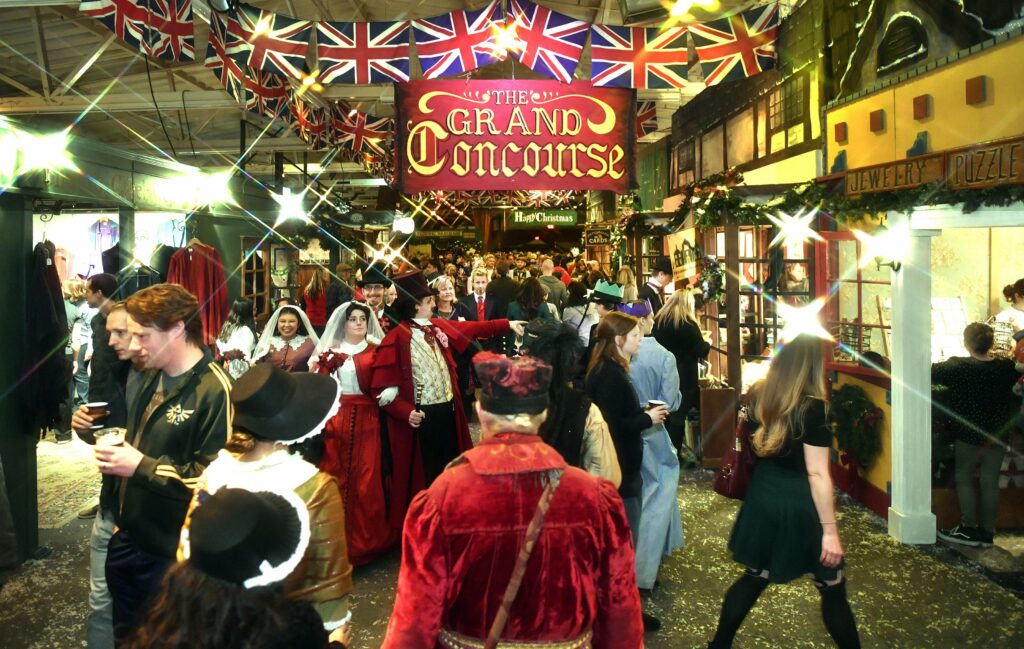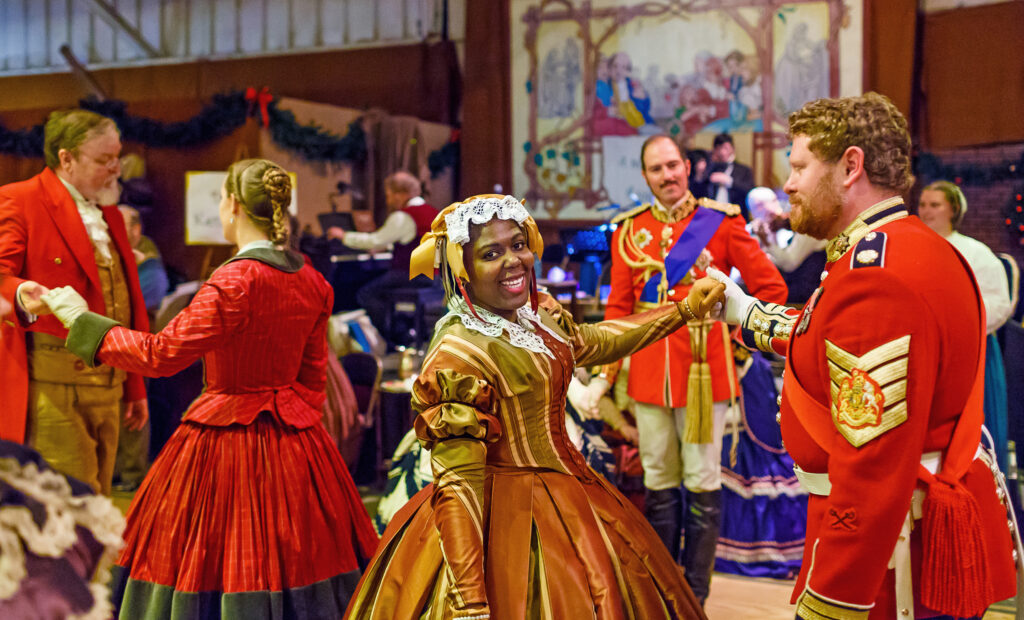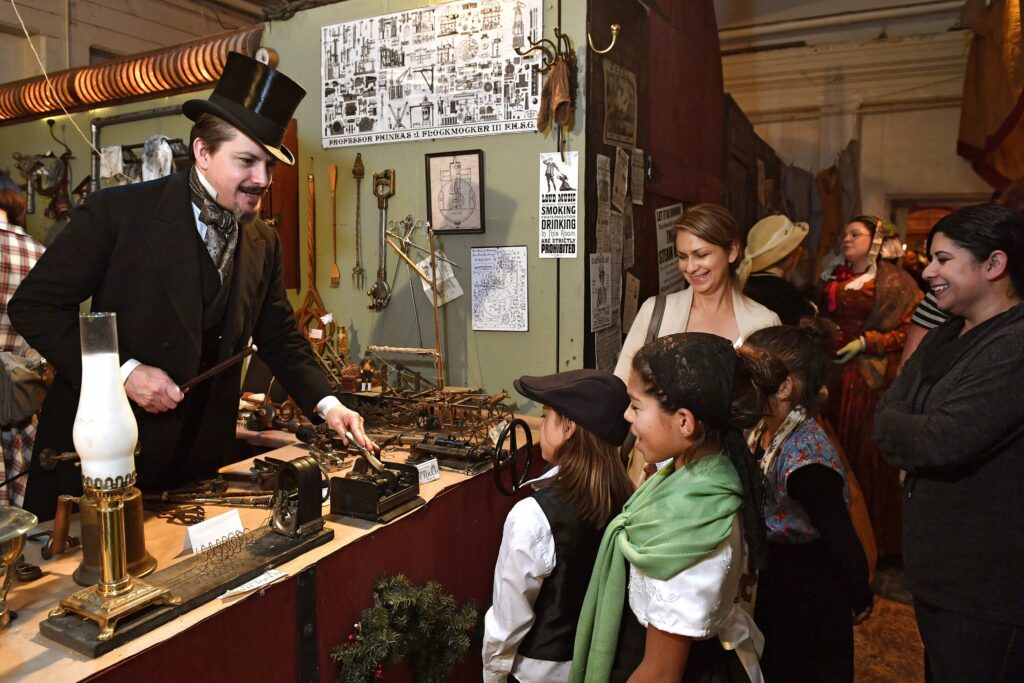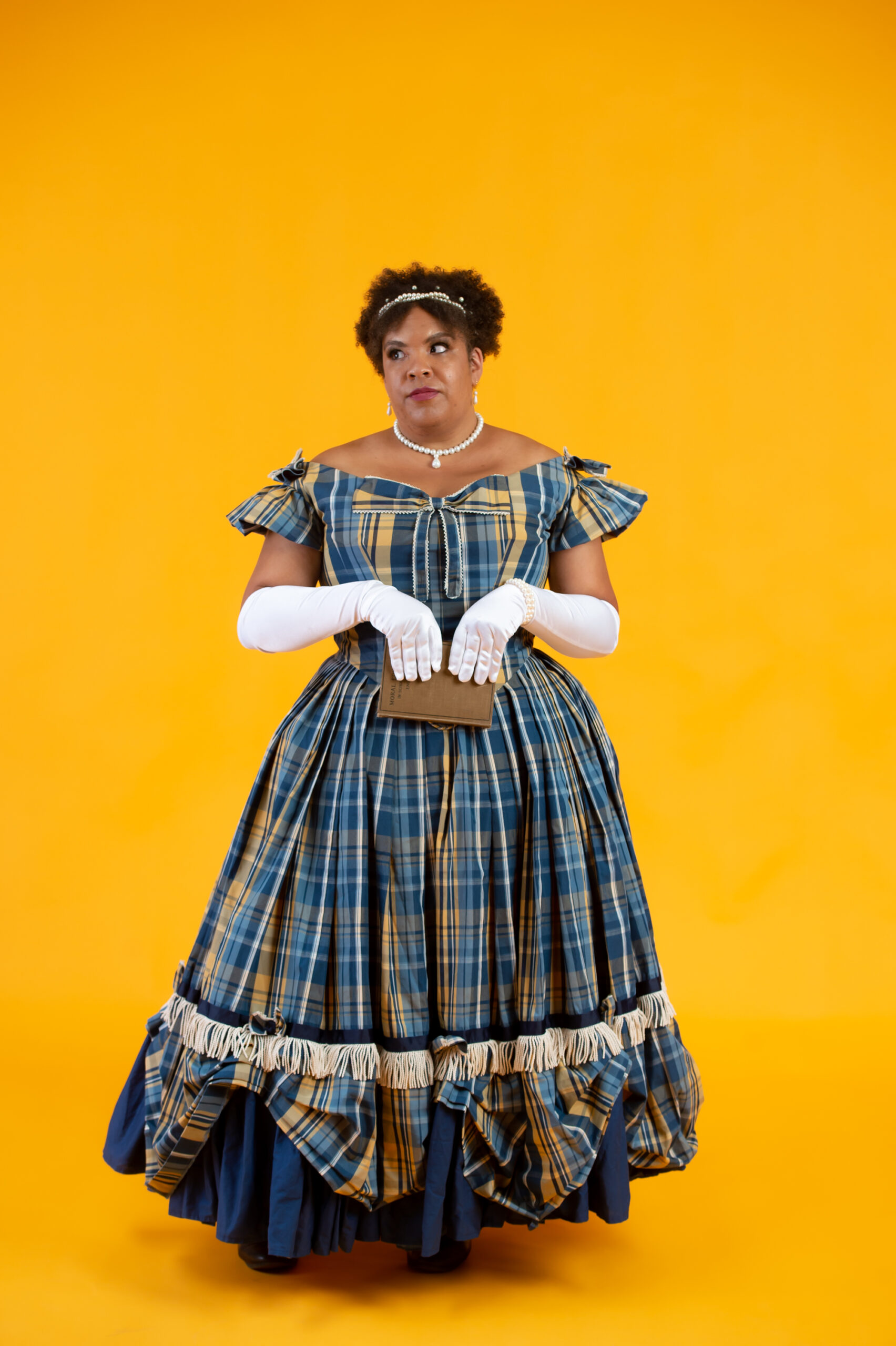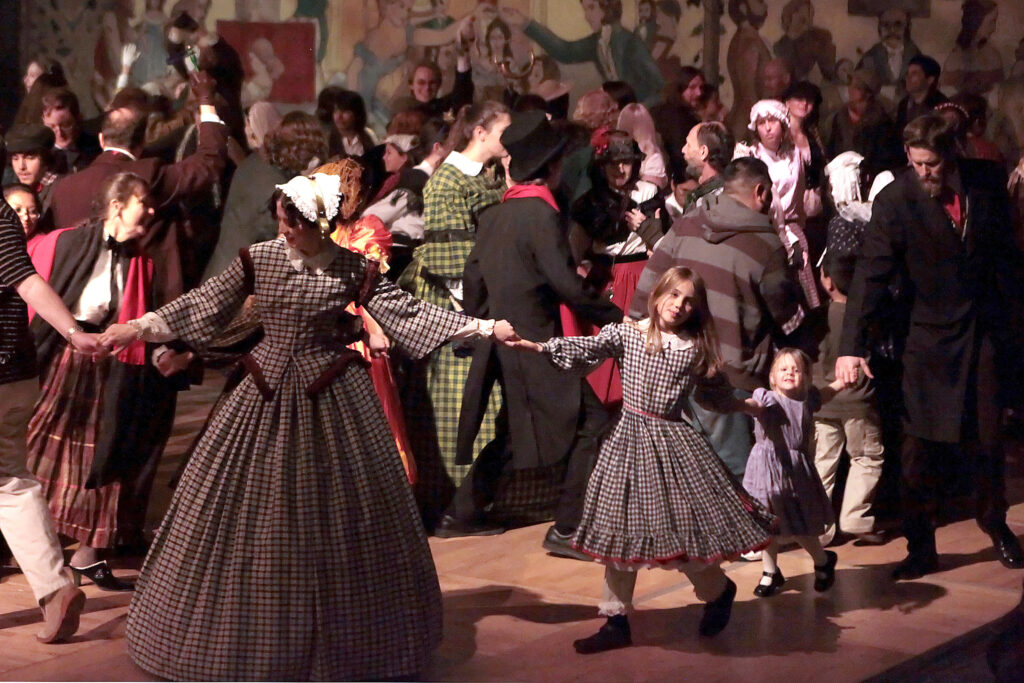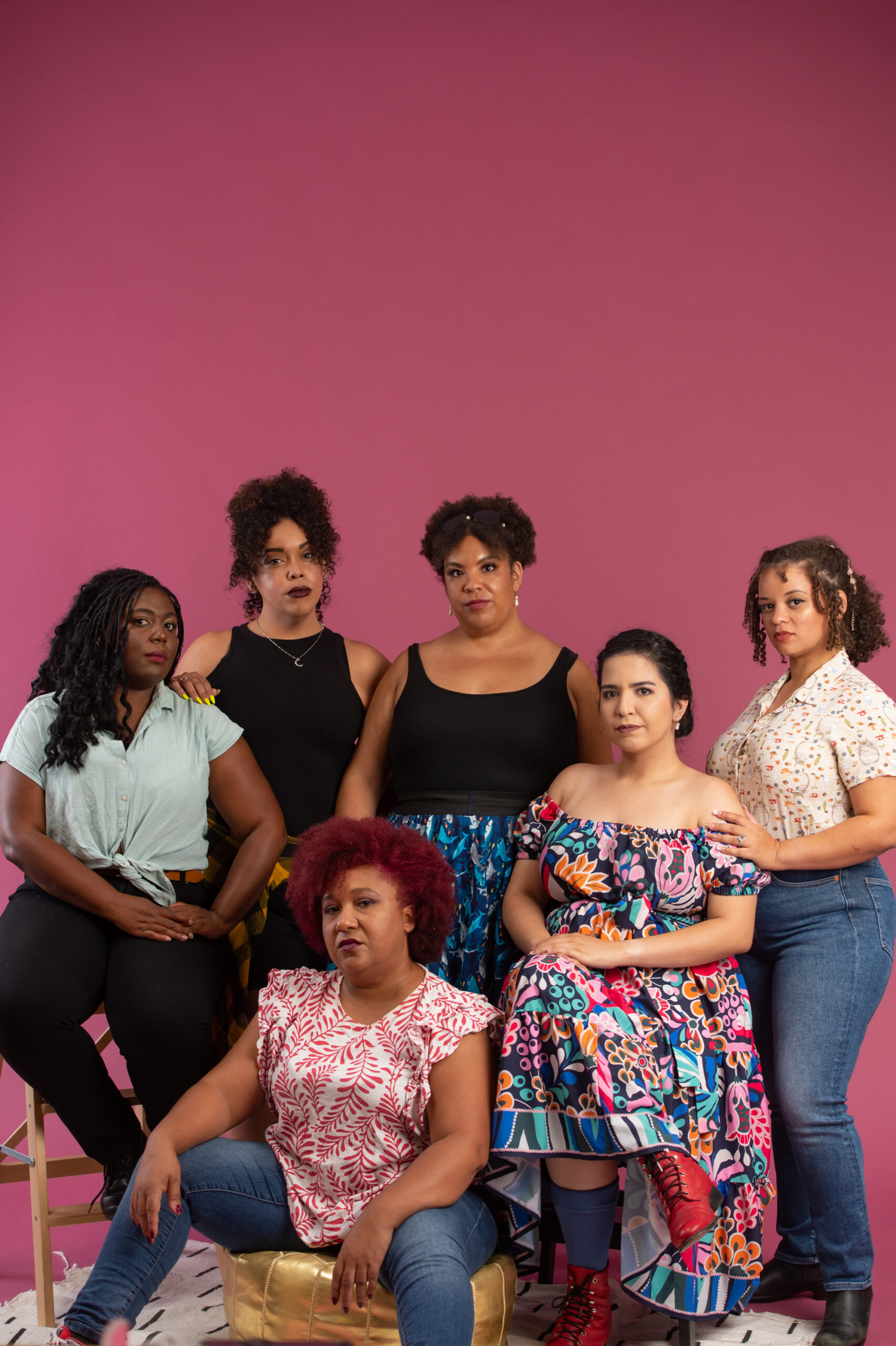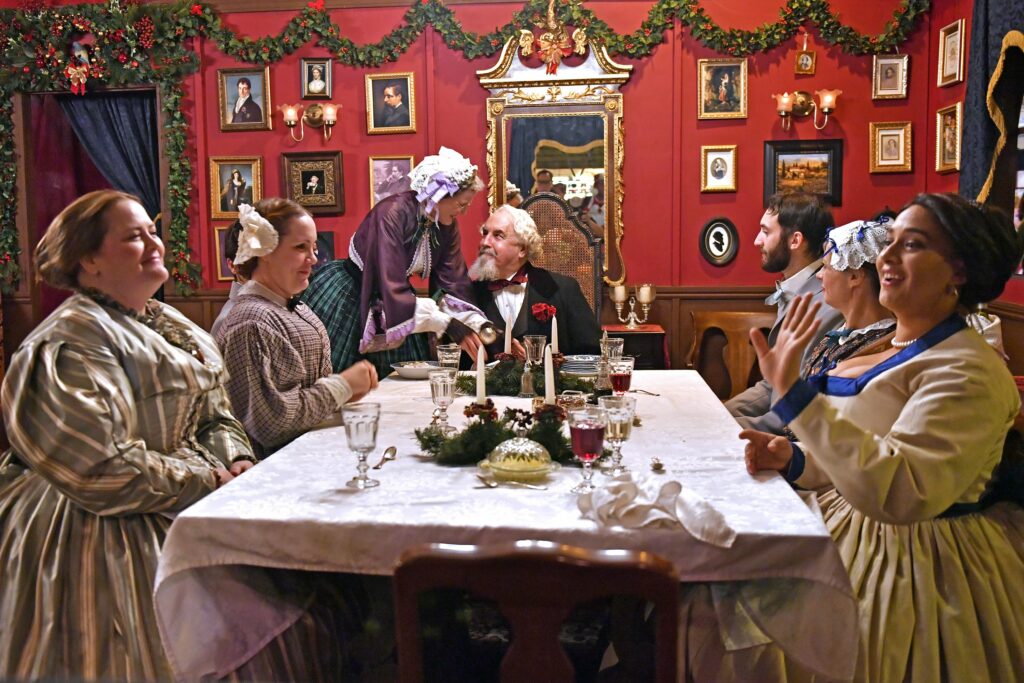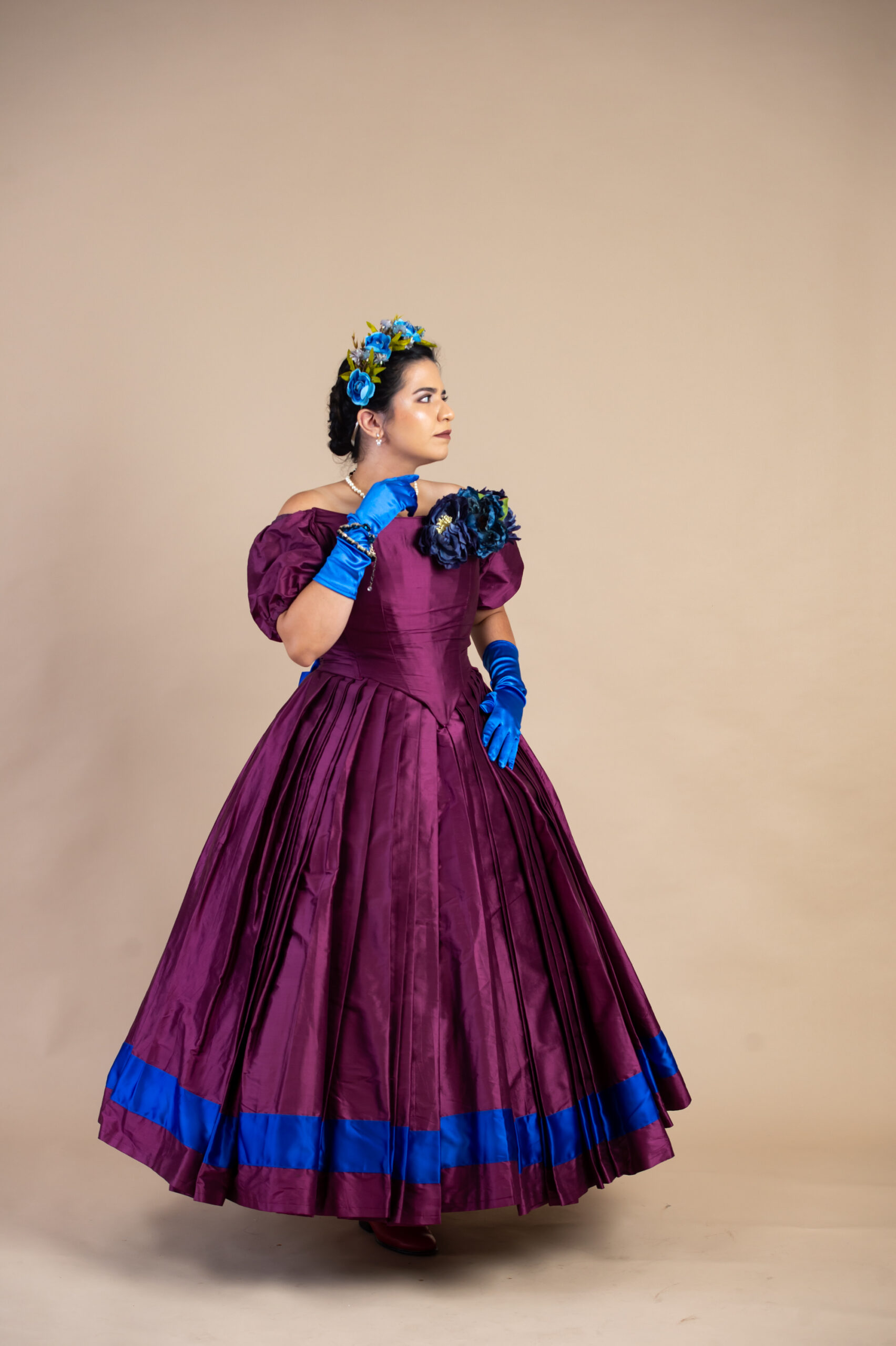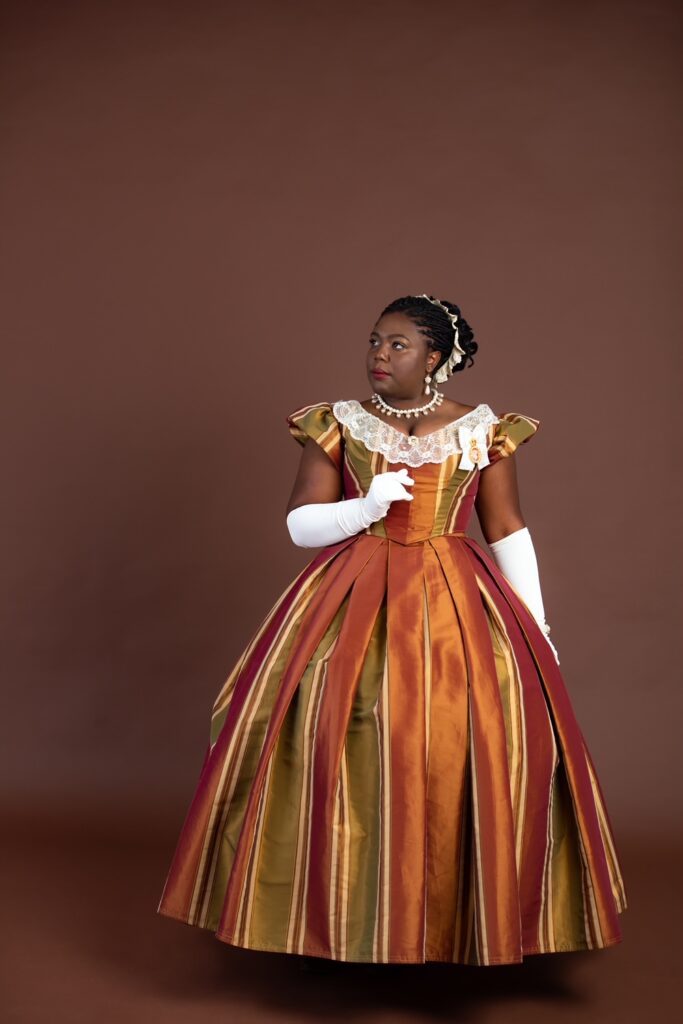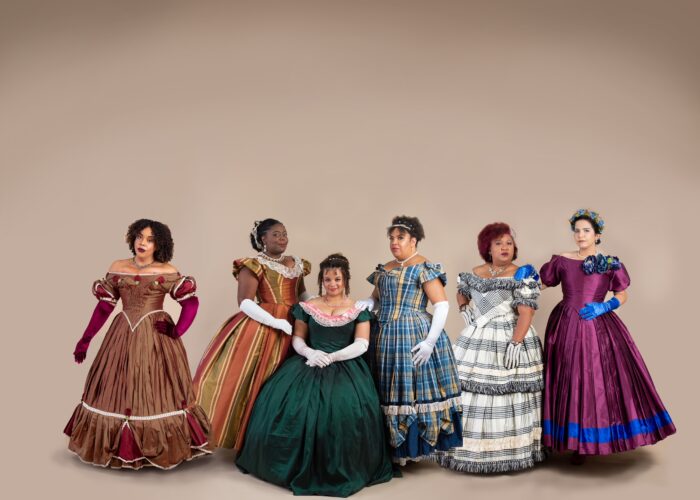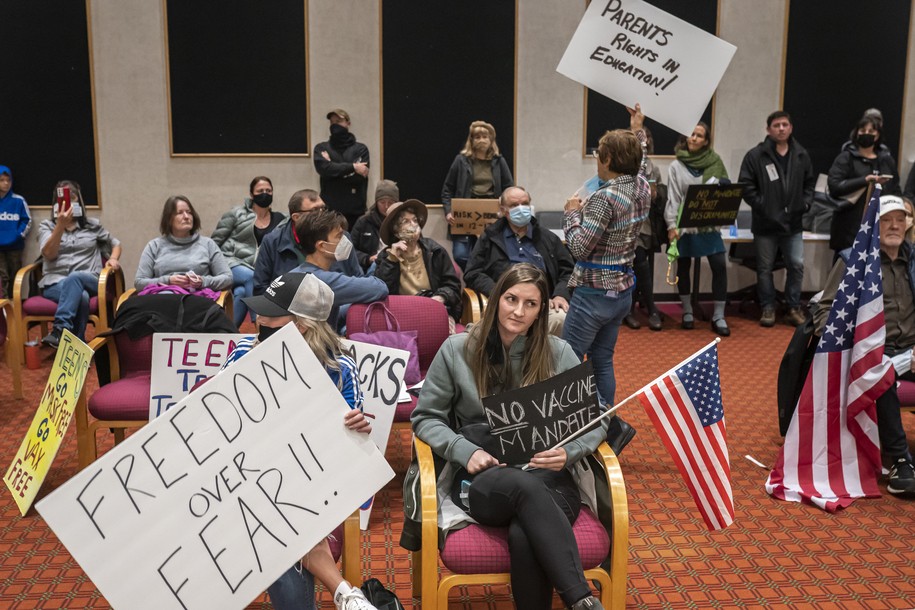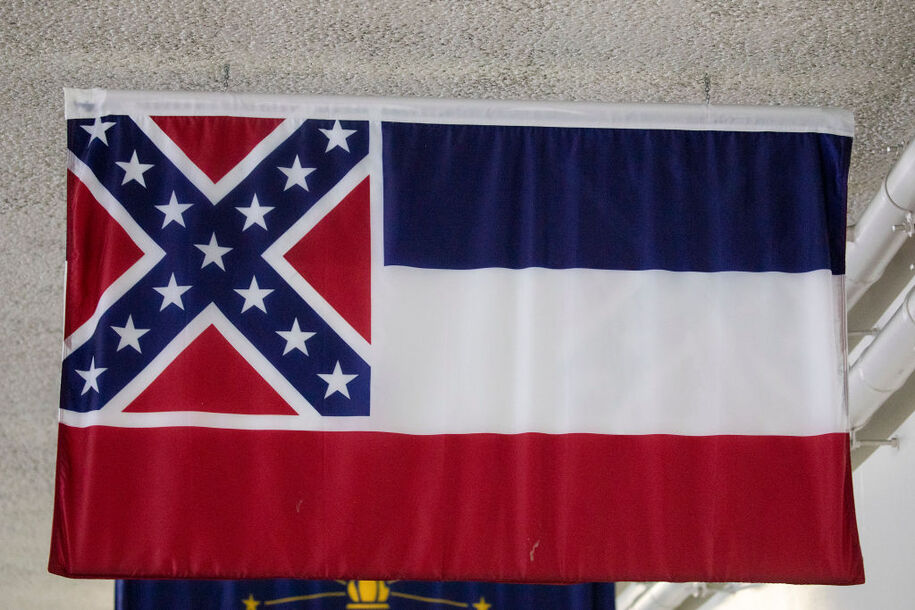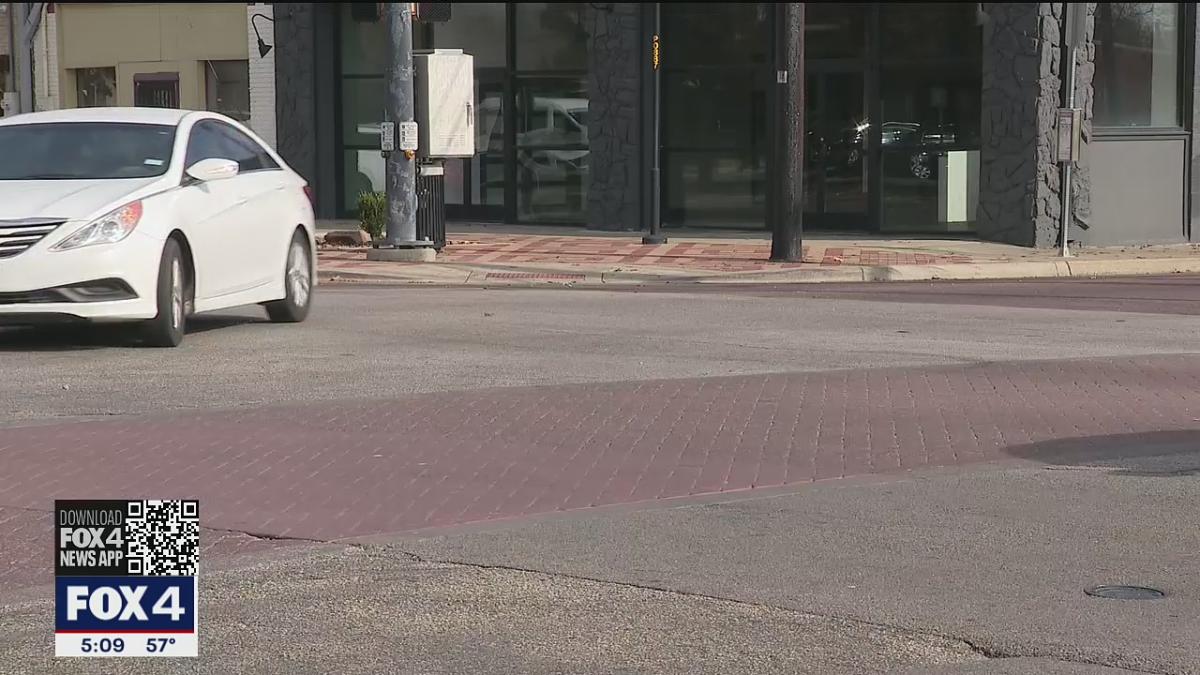L
aToya Tooles models a costume she has worn at the Great Dickens Christmas Fair. She and many other cast members are boycotting the event this year. Photo: Chloe Jackman / Represent Collaborative
For her first Great Dickens Christmas Fair in 2015, LaToya Tooles fashioned a gown out of dollar-store hula hoops and a tablecloth. A friend had invited her to the annual event, a festive re-creation of 19th century London inspired by the works of Charles Dickens that has been running in San Francisco for nearly 40 years.
Almost as soon as she arrived at the antique winter wonderland, she joined the revelers on Fezziwig’s dance floor and didn’t stop waltzing for hours.
“I met some of my greatest friends at the Dickens Fair,” says Tooles, who went on to join the event’s volunteer cast, taking on bigger roles and more responsibility each year.
Her history with the tight-knit fair community is what makes the past two years so heartbreaking for Tooles, who is one of a small number of Black cast members at the Great Dickens Christmas Fair. What started as a goodwill effort to help rectify what is seen as the event’s failure to protect its volunteers and guests from racist and sexist behavior has turned ugly. Now, more than 200 cast members and thousands of guests have pledged to boycott this year’s fair, which is set to return to the Cow Palace on Saturday, Dec. 4, in a scaled-down, drive-through experience for the next three weekends.
“I want people to recognize what their values are and decide if the Dickens Fair aligns with them,” says Tooles, founder of an affinity group for the fair’s Black performers called Londoners of the African Diaspora, or LoAD.
Organizers of the boycott, a group of Dickens Fair cast and crew dubbed the London Solidarity Network, won’t support a return to the fair until a list of safety requirements is met.
A petition in support of the action has already received more than 3,000 signatures.
“Now is our moment to raise our collective voices against injustice,” the petition reads, calling on the fair’s administration at Red Barn Productions “to make The Great Dickens Christmas Fair a safe and equitable space for all.”
W
omen of color who have been cast members at the Great Dickens Christmas Fair: Angel Dotts (left), LaToya Tooles, Victoria Spencer, Leandra Darden, Anastasia Elizondo and Mandy Beri. Photo: Chloe Jackman / Represent Collaborative
Representatives from Red Barn Productions, which puts on the Dickens Fair, call the boycott “a surprise and a disappointment.” They point to a series of actions they have taken to try to address LoAD’s concerns, and insist that management has always been professional and compassionate. But now, after months in which nearly every corner of public and corporate life has faced a racial reckoning, this year the fair is facing its own opposition.
While less has been said about equity issues in hobby and play spaces, the fight against discrimination in those spaces can be more complex. Americans dedicate an average of five hours a day to leisure and sports activities, but these arenas often lack formal organizational structures for initiating or carrying out substantive change. For Black people, the harm can be multiplied when they find themselves facing discrimination in spaces where they are going for rest and relaxation — especially when their hobby involves pretending to exist centuries ago, in places where equality and safety for marginalized people were even further out of reach.
“Every member of LoAD has been called a slave,” says Anastasia Elizondo, an Afro-Chicana actor and comedian from Oakland who has been performing at the Dickens Fair for nearly 20 years. She adds that fairgoers’ limited knowledge of Black history can lead to offensive generalizations and assumptions. “One of us has been called Aunt Jemima, another Sally Hemings.”
Angel Dotts shows off a costume she wore at the Great Dickens Christmas Fair, an event she is boycotting this year. Photo: Chloe Jackman / Represent Collaborative
Angel Dotts, who is biracial and calls herself a Dickens “Fair brat,” started attending with her parents when she was a toddler. She says she’s used to being one of the few brown faces at the fair, but when her husband, a Black man, started attending, she began to understand what the situation was like for attendees of color. Despite having a cast member pass, she says he was stopped at every security gate — not just by hired security officers, but also by fellow fair participants, and looked at with suspicion by vendors.
“His experiences started to make me recognize that this was not a safe space,” Dotts says.
According to others in the world of historical costuming and re-enactments, what’s playing out in the Bay Area is not an anomaly.
“Dickens is one great example of what’s been going on in these places for a while,” says Bianca Hernandez-Knight, a lifetime member of the Jane Austen Society of North America.
Hernandez-Knight recently resigned from all her roles on the society’s national board after months of a back-and-forth with the group’s leadership over a proposed (and ultimately rejected) diversity statement.
“This all relates to a bigger conversation around how people view history,” she said. “The issues we are facing in historical costuming spaces and the backlash to critical race theory — I genuinely think those things are very similar. There are people who just really need their history to be as whitewashed and as comfortable for them as possible.”
T
he Grand Concourse of the Great Dickens Christmas Fair at the Cow Palace. Photo: Rich Yee
This isn’t the first time Red Barn has been alerted to concerns among its cast. LoAD is just one established affinity group within the fair. During a roundtable in May, which included members from other groups, a representative of survivors of sexual and gender-based violence at the Dickens Fair said that known offenders “have been able to prey upon and abuse other participants for decades.” This has spurred many fair participants to keep a list of such predators and abusers so that they can warn new participants.
In 2019, more than 15 people sent letters to Red Barn describing their experiences with sexual assault or harassment, resulting in the dismissal of a serial offender. But the stories stayed locked away inside the “fair family” — with no human resources professional on staff or a formalized process for reporting abuse.
Red Barn CEO Kevin Patterson says that affirmative consent training was implemented in 2016, but admits it was not enough. But he also believes that the scope of the problem has been overblown.
“Social media has made one complaint sound like 1,000 complaints and one circumstance sound like the norm, when it is the outlier,” he says.
For Ari Yovel, who is autistic and transgender, the current conflict LoAD members are facing parallels their own struggle to advocate for marginalized communities within the fair. For years, Yovel advocated as a representative of the Order of the Golden Needle, a neurodivergent advocacy group, for a de-stimulation space within the fair, or “de-stim” room. “Each time, I was met with the sentiment that even though they took my requests very seriously, they just couldn’t possibly do anything about them. All the while, I was being paraded out as a poster child for how progressive and cooperative RBP (Red Barn Productions) were,” says Yovel, who is boycotting this year’s fair and is unsure if they will ever return.
A character dressed as Prince Albert presides over Queen Victoria’s brilliantly attired court at the Great Dickens Christmas Fair at the Cow Palace. Photo: Robin Fadtke
In June 2020, when Red Barn Productions released an emphatic statement of support for the Black Lives Matter movement, LoAD saw an opportunity to ensure the company’s actions aligned with its words.
At Red Barn’s request, LoAD members spent weeks researching and crafting a meticulous 53-point plan that addressed developing a standardized method for reporting harassment and discrimination, ensuring increased representation of Black, Indigenous and people of color at the fair, conducting mandatory antidiscrimination training and hiring HR and diversity and inclusion professionals. It also asked that Red Barn discontinue a tradition of portraiture casting, a practice that casts only people with an aesthetic resemblance to a historic character.
But after LoAD submitted the initiative in August of last year, Tooles and others said, Red Barn continually refused to engage with the document or complete the requested review steps. What LoAD felt were requests for simple acts of solidarity — such as making a public statement to condemn a racist post by a longtime fair vendor — were met with resistance. “This is more complicated than you may imagine. … The general public who attend the Fair could be confused and even agitated by a public post like this,” Patterson wrote in an email.
Professor Flockmocker’s workshop at the Great Dickens Christmas Fair at the Cow Palace. Photo: Rich Yee
Scheduled meetings were repeatedly canceled, and verbal commitments to make specific changes were contradicted by several actions: Instead of a promised HR professional, the company hired a dramaturge, or artistic director. A verbal agreement to halt portraiture casting was not carried out, they said, and the practice in fact seemed to be reaffirmed in a meeting of fair directors.
But Patterson says his instructions to fair directors about casting policy were misunderstood.
“We had every intention of maintaining that agreement with LoAD to enact color-conscious casting,” he says. “In the course of the intellectual conversation, it was taken way out of context and misunderstood as being something we were changing our minds on.”
While members of LoAD felt they’d been deceived, Patterson’s response seemed to calm things, and the uproar in the wider fair community quickly died down.
Leandra Darden poses in a costume she has worn at the Great Dickens Christmas Fair, an event she and many other cast members are boycotting this year. Photo: Chloe Jackman / Represent Collaborative
For LoAD member Leandra Darden, however, the moment brought a revelation.
“The community proved to me that it was unwilling to protect itself, not just me,” she said. “I really believe that if white women don’t demand things, Black women cannot get them.”
The Great Dickens Christmas Fair grew out of the Southern California Renaissance fair scene of the 1960s.
Ron and Phyllis Patterson staged the country’s first
Renaissance Pleasure Faire in 1963. By 1968, the couple began hosting a holiday party at their Hollywood Hills home that re-created Charles Dickens’ version of Victorian London. The parties were such a hit the Pattersons decided to stage them on a larger scale and open them to the public.
In 1970, the first Great Dickens Christmas Fair debuted at the old Anchor Works warehouses (now Levi’s Plaza) in San Francisco. It changed locations over the years, moving to Oakland at one point before landing in Daly City at the Cow Palace, where it’s been staged for the last two decades.
When Ron Patterson died in 2011, his son Kevin took over the business, now known as Red Barn Productions, which he runs with his wife, Leslie, and son Andrew. The quirky holiday party hosted by a theater-loving family has become a massive, month-long event with dozens of vendors, a volunteer cast and crew of more than 1,400, and 66,000-plus ticketed guests each season.
Attendees at the Great Dickens Christmas Fair dance in costume. Photo: Raymond Van Tassel
The event was not held in 2020 due to the COVID-19 pandemic, but Red Barn promised to pick up the discussions with LoAD in early January. Meetings were canceled or postponed until early May. By April, both the artistic director hire and the casting policy were announced, which spurred LoAD to take action.
At the scheduled May 6 meeting, it issued a statement of no confidence in Red Barn Productions to manage the Dickens Fair. It also demanded the formation of a supervisory board and the hiring of a qualified HR consultant and a diversity and inclusion professional. The group set a deadline of May 14 for Red Barn to agree to those terms or face public exposure and a possible boycott.
“Our trust had been broken too many times,” says Tooles.
Women of color who have been cast members at the annual Great Dickens Christmas Fair and are boycotting the 2021 event:LaToya Tooles (left), Angel Dotts, Anastasia Elizondo (seated), Leandra Darden, Mandy Beri (seated) and Victoria Spencer. Photo: Chloe Jackman / Represent Collaborative
On the day of the request, Red Barn spokesperson Shannon Damnavits announced that the Dickens Fair Cast & Crew Facebook page would be archived, with posting disabled. She also released a statement on the Facebook page saying Red Barn was “shocked and saddened by the abrupt and declarative actions of Londoners of the African Diaspora,” characterizing LoAD as a threat: “Tonight they elected to walk away from the table and are attempting to take over the Dickens Fair.”
Within days, that statement was replaced with a post that read “we hear your concerns” and emphasized the company’s commitment to “continue with its Diversity, Equity and Inclusion work.”
In the months since, Red Barn has made a human resources hire, launched a “Red Flag Reporting System” for people to anonymously report any improper activity, and engaged a diversity and inclusion firm, Hummingbird Humanity. It has a new single-page DEI Commitment statement that “encourages” BIPOC representation rather than requiring it, and is asking that all Dickens cast, crew and vendors sign it and pledge to be better.
Red Barn says its full statement on diversity and inclusion should be finished early next year.
“We are going to work together to see what needs to be done in the future to make things not just satisfactory, but excitingly better for everybody,” Patterson says.
Red Barn, however, has declined to create a supervisory board, something LoAD members see as non-negotiable.
“We’re a privately held company, not a nonprofit organization, we’re not going to be governed by a board,” says Patterson. “We know for a fact that over time, we will rebuild the trust that is necessary. They don’t need to wrest the power away from us and make all these decisions.”
A character portraying author Charles Dickens presides over a holiday feast in his family parlour at the Great Dickens Christmas Fair. Photo: Rich Yee
The contentious negotiations with the fair’s administration has soured many former devotees on an event that once seemed magical.
“I love making old dresses. I love dancing. But I do not love them more than the safety and well-being of myself and others who are marginalized,” says Tooles.
More than 200 former participants, including members of LoAD and other affinity groups, will be boycotting the event with Tooles. In solidarity, several of its traditional performing groups — including Jeremy’s Escort Service, Fezziwigs, the Royals and the Fairies — have declared that they will not participate. More than 3,000 cast and crew members, vendors and guests have also committed to boycott.
As the movement has grown, some Dickens Fair cast members and vendors who have been on the periphery of the yearlong conversation have jumped in, aghast and aggrieved that the advocacy groups are “trying to ruin the magic” and “destroy Dickens.” But Tooles and others maintain that they are trying to fix the fair, not harm it. They also make clear that walking away from Dickens amounts to more than just losing a beloved hobby.
Mandy Beri poses for a portrait dressed in a costume she has worn at the Great Dickens Christmas Fair. She and many other cast members are boycotting the event this year. Photo: Chloe Jackman / Represent Collaborative
LoAD member Mandy Beri, who is deaf and autistic, has been performing at the Dickens Fair since 2016 as part of the Coventry Carolers choir. It’s an experience she especially treasured because the fair was one of the few places she says she’s been able to showcase her vocal talent.
“I’m likely going to lose a lot of friends in this process, because I won’t see them,” says Victoria Spencer, who lives in Southern California but would travel north every year just for the fair. “I’m also recognizing that I’m losing people that weren’t ever really my friends. There’s a lot of relationships that won’t ever be the same because we took this stand.”
Others, like Elizondo, are less sanguine. She says she has been snubbed by people she considered longtime friends over speaking out. “But that’s our history, though, isn’t it, as Black people in America? People love to say, ‘Look at these amazing Black women. Look what they’ve done’ — until it no longer benefits them. Then they’re gonna push us to the front and let us take the bullets.”
LaToya Tooles poses for a portrait dressed in a costume she has worn at the Great Dickens Christmas Fair. She and many other cast members are boycotting the event this year. Photo: Chloe Jackman / Represent Collaborative
For Tooles, the chapter of her life that included hours of waltzing on Fezziwig’s dance floor is now closed. But she didn’t exit the party without leaving a gift.
Earlier this year, LoAD created a document that laid out minimum requirements for a safe Dickens Fair. It includes a zero-tolerance policy for sexual harassment; the renovation of a long-secret VIP bar known as the Opium Den seen as rife with Asian stereotyping; allowing all trans or nonbinary actors to portray the gender representation of their choosing; and more.
In other words, they are advocating collective liberation.
“Dickens Fair will probably continue on after this conversation,” says Tooles, “but whatever changes that happen inside of that organization are because we did not shut up.”
About this story
This story was produced in partnership with Represent Collaborative, a San Francisco media initiative focused on issues of racial and social justice that works to produce stories about Black and brown communities. Learn more at www.representcollaborative.com.
More than 200 former Great Dickens Christmas Fair participants are organizing a boycott, saying it has not done enough to address concerns from people of color.

datebook.sfchronicle.com


